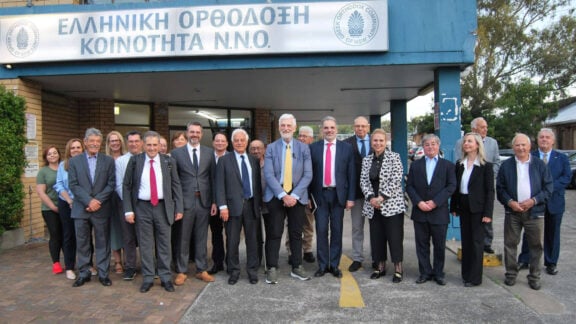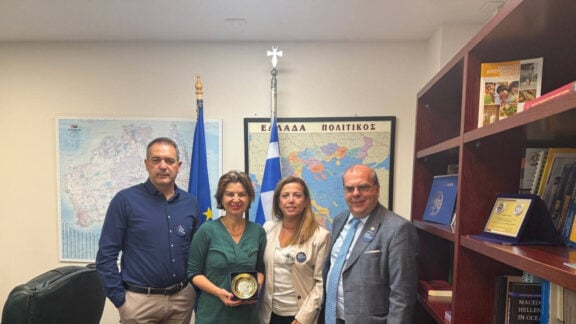Greece is undergoing a work crisis with 300,000 job vacancies and numerous foreign workers leaving illegally at night in search of better opportunities in other European countries, with the result set to have a vast impact in tourism-related areas.
The tourist season commences with 85,000 job openings, over 100,000 workers missing from construction, more than 70,000 in agriculture, and over 50,000 in the industry, as reported in Proto Thema.
The numbers add up to roughly 300,000 job vacancies this year, a major concern for Greek entrepreneurs, with six out of ten foreign workers (mostly from developing countries) leaving illegally at night for Italy, Germany, Spain and other European countries in search of better wages and benefits.
In construction, firms have taken on projects worth €20 billion and are seeking an additional 55,000 workers over the years 2024-2025 and a total of 250,000 employees, with a focus on skilled engineers and technicians to meet project demands without delays.
Currently, there is a considerable shortage of welders, plumbers, carpenters, and heavy machinery operators.
There is a lack of warehouse workers, packers, forklift operators, and in tourism and hospitality, there is a demand for housekeepers, chefs, spa therapists, and front office staff, while technology companies are also aggressively hunting for programmers and other highly qualified specialists.
George Hotzoglou, president of the Hellenic Federation of Tourism and Hospitality, stated that applications for staff re-hiring are down by 10% compared to last year, suggesting they will face serious staff shortages again.
He identified a main cause being the long hours and poorly paid positions.
“Seasonal workers work without breaks for 15 hours a day. Housekeepers are hard to find, often leaving at night because hotel owners demand that they clean 25 rooms during their work hours due to staff shortages,” Hotzoglou said.
He noted that the implementation of the digital work card, which has officially begun, will offer some protection regarding work hours, including recognising extra hours on weekends, holidays, and nights.
“We might suddenly see, under the threat of fines, many more overtime hours being reported that are currently hidden,” Hotzoglou said.
“However, despite these positive measures, workers still refuse to work. They prefer to take jobs as delivery drivers or supermarket employees. They want better conditions and pay.”
Worker migration from developing nations approved by the government this year stands at 89,000, with those from legal channels hailing from countries like India, the Philippines, Bangladesh, Vietnam, Nepal and Egypt.
There are a number of workers, however, that may enter illegally with large construction sites in particular employing many from Africa, emphasizing the need for projects to proceed.
There is an added hurdle that the application process takes too long, meaning that by the time people are ready to work (usually August or September) the tourism season is practically finished.
The entire process—from requests recorded on the unified list for migrations to the embassies and consulates issuing visas—often takes six months, with another month needed for a Tax Identification Number (AFM) and the Social Security Number (AMKA) to be issued so that a foreign worker can start working.
Grigoris Tasiou, president of the Hellenic Hotel Association, stressed planning needs to have a longer-term strategy.
“This year is a lost cause once again. We should be preparing lists for migrant workers for 2026, not searching for workers for this summer,” he said, noting that a platform needs to be implemented well in advance of the tourism season that documents personnel needs.
Tasiou added that embassies and consulates “should be staffed adequately to expedite visa approvals and more bilateral agreements should be signed”.
The phenomenon of many workers leaving shortly after arriving to other European countries is reported to be based on a number of factors, mainly that having to cover basic provisions (food and housing) takes up too much of their wage.
People within the Ministry of Migration and Asylum highlight that a legislative initiative is soon to be promoted to simplify and digitize the processes for issuing AFM and AMKA for foreigners, and, in collaboration with the Ministry of Foreign Affairs, bolster embassies with staff to relieve their workload.
Evangelos Kanellopoulos, CEO of WorkInGreece.io—a platform that helps bridge the gap between workers from third countries and businesses—identified the three biggest barriers in the migration process.
Two, as mentioned earlier, refer to the lengthy migration process which takes four to six months, and the living and travel expenses that make it difficult for the workers to save enough (which is why many opt to leave illegally to other countries).
The other barrier he noted is the high rejection rates as even fully qualified candidates with certifications and experience are rejected by Greek embassies at rates ranging from 40% to 80%, creating insecurity and frustration among candidates and Greek businesses.
“Greece can become a model,” Kanellopoulos said, believing structural reform and cooperation among all stakeholders is key to creating a functional, effective system.
“Our country has the potential to evolve into an international model for sustainable and fair management of labour migration. However, this will only happen if we move decisively, targeted, and in coordination.”
Source: Proto Thema









